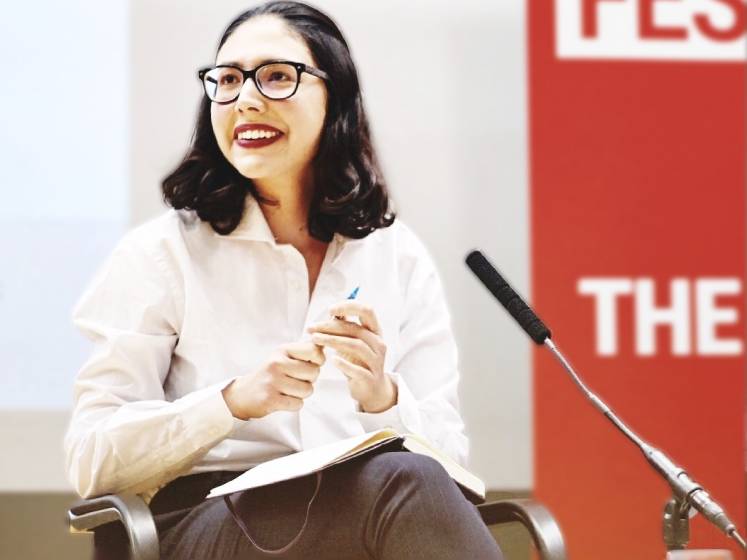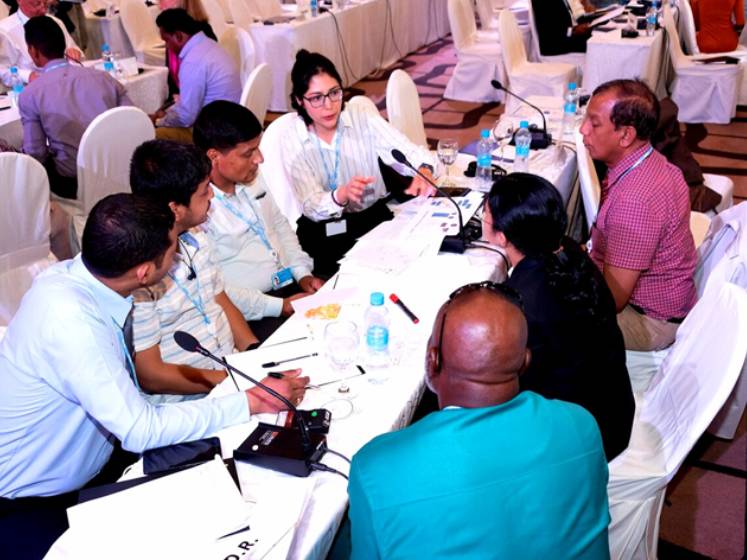 Ria Sen speaks at an event.
Ria Sen speaks at an event.
Ria Sen (MSc Media, Communications and Development 2012) is a Disaster Risk Reduction Expert with the United Nations World Food Programme (WFP), which seeks to eradicate world hunger. Ria talks to us about her career in disaster risk reduction and why the World Food Programme is a well-deserved winner of the 2020 Nobel Peace Prize.
What is your role with the World Food Programme?
I started as a Preparedness Officer in WFP’s technology division in 2018. My job focused on how the telecommunications sector can help national governments be better prepared for emergencies. For example, we develop tools and run technology simulations of potential disasters, like typhoons. The countries I worked with ranged from the Caribbean to Mozambique, so it has been a thrilling and professionally enriching journey so far!
This year, I’ve changed roles in the organisation and I’m now the lead disaster risk reduction specialist. I work on intergovernmental policy, supporting the development of disaster risk assessment tools. Since my work is global, the scope is quite wide ranging, which I find fulfilling and satisfying.
How did you come to work in disaster mitigation?
I’ve had an interest in international development for a long time. My dissertation at LSE, which looked at information communications technology (ICT) and development policy, was a marriage of spaces that seem different but are actually connected. Technology is critical if you want to be able to mitigate risks, with early warning systems being a key example of how technology can help achieve this. Regardless of how developed a country is, the ability to cope, absorb the shock and bounce back from disasters depends on how prepared it is.
In fact, if a country is not prepared, the risks they are exposed to can have implications for their future development. This pandemic is illustrating how disasters can affect the trajectories of all countries and have ripple effects on development and global progress.
 Delivering a disaster simulation exercise for government and private sector representatives in the telecoms sector. Photo credit: ITU
Delivering a disaster simulation exercise for government and private sector representatives in the telecoms sector. Photo credit: ITU
How did you feel when you heard the news about the Nobel Peace Prize?
I was actually with a colleague who works on the WFP communications team. She got the alert on her mobile the moment it was announced, and I was just in a state of delight! I also felt a sense of pride and a burst of energy to keep working towards our goal of zero hunger. The prize was completely unexpected, but it has shown that WFP’s work is valuable and recognised. I think it has underscored the urgency of what we do.
Many of our workers are on the frontline, putting their lives at risk by working in places that are dangerous, where most people would run from. I am very glad that the value of this work has been recognised.
Why do you think that the World Food Programme is deserving of the award?
WFP assisted around 100 million people in 88 countries in 2019 alone and it is the world’s largest humanitarian organisation working to address global hunger and food security. When the UN made zero hunger one of their sustainable development goals, WFP became a key instrument for achieving this. So, while we know the situation is going to be more difficult in the light of COVID-19, WFP’s work in remote places and difficult conditions is a testimony to the human will to overcome. WFP has said that food is the best vaccine against chaos. For a world that is peaceful and stable, food security is critical.
 A student reads in the Shaw Library, a favourite place for students seeking some quiet time.
A student reads in the Shaw Library, a favourite place for students seeking some quiet time.
What are your fondest memories of your time at LSE?
One of my nicest memories is going to the Shaw Library whenever I wanted a quiet moment to read. It made me feel like I was home. I love going back to LSE and experiencing the buzz on campus - it feels like a familiar and old friend. Sometimes I go back to London just to experience that sensation again. A lot of my memories are of studying in the library with friends, or meeting in cafes to discuss and debate. Those years were special years dedicated to thinking – that’s a luxury that one often doesn’t have outside of university life.
How has your time at LSE influenced you in your life?
I feel that being proactive and having a ‘can do’ attitude really encompass the atmosphere at LSE. These concepts now form the core of my ethics and way of life. I really value the learning that came from LSE – the connection to the real world and the pragmatic approaches to problem solving. This is always underpinned by the need to investigate the causes of things. I think it’s valuable to form a rational understanding of how things work and how things function. I hope I never lose that sense of curiosity and the rigour that LSE makes me approach life and work.
The opinions expressed are Ria Sen’s personal views and do not represent the official viewpoints of the UN’s World Food Programme.